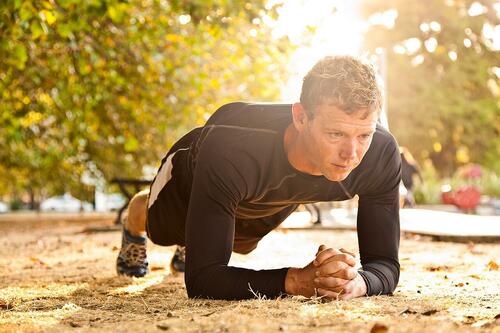5 Key Exercises To Keep Your 40s From Feeling Like Middle Age
Authored by Kevin Shelley via The Epoch Times (emphasis ours),
Welcome to middle age. Sounds strange, doesn’t it? People in their 40s are still quite young, in their prime working years, and possess the blush of youth that society cherishes.
Your 40s are often a time of peaks: Your career history may be established, your family may be maturing, and you are still full of energy and vitality. However, you aren’t officially “young” anymore. The advancement into your middle ages introduces you to a time when your muscles become harder to maintain without dedicated exercise and when sedentary behavior comes at a higher price.
But don’t let this make you feel old, whippersnapper, because you aren’t. Besides, you can continue to stay strong and energetic with just a little exercise, and I’ve provided some great ones for you to get started.
The key here is maintaining muscle mass and flexibility to counteract the beginning of muscle decline and decreasing joint mobility. At this stage in life, managing stress and finding time to maintain healthy habits amid career and family responsibilities is crucial. You’ll be pleasantly surprised at how little time it can take.
I suggest establishing a workout routine with your family and friends to increase socialization and maximize exercise consistency. It may also be helpful to consult your physician to ensure that these exercises are right for you.
5 Key Exercises for Your 40s
1. Plank
The plank is an excellent, classic core strengthening exercise that can be performed nearly anywhere. It’s challenging at first, but progress comes quickly.
Step 1: Assume a prone position on the floor, lying with your chest and stomach downward. Rise onto your elbows while keeping your upper arms straight and at shoulder-width, palms on the floor, head up and facing forward, and your back straight (a straight back is critical).
Step 2: Hold this position for as long as you can, up to 1 minute.
Step 3: Try doing 3 sets for 1 minute each, taking 1 minute of rest between each set. Perform 3 rounds of plank , which counts as 3 sets.
Planks are an excellent exercise on their own but are even better paired with the other exercises.
Modification: You can make planks easier by bringing your forearms or knees to the floor.
2. Pushups
Pushups are renowned for their ability to provide an excellent workout in a simple, controlled movement.
Step 1: Start on the floor with your feet together, palms flat on the floor, and arms fully extended. This is the classic starting position for pushups.
Step 2: Lower your body by bending your elbows until you’re almost touching the floor. Keep your back and legs straight as you lower yourself.
Step 3: Push yourself back up to the starting position. This counts as 1 repetition. Aim for 3 sets of 10 repetitions, making adjustments as needed.
Modification: To make this exercise easier, you can keep your knees on the floor and limit how far you bend your elbows and lower your body.
3. Weighted Squat
Weighted squats target the legs and gluteal muscles and take the standard bodyweight squat up a notch in both difficulty and benefit.
Step 1: Stand with your arms by your sides and your feet approximately body-width apart. Hold 1 to 2 pounds of weight in each hand. Canned goods work well in this role, but feel free to add weight.
Step 2: Start by slowly squatting down until your knees are bent at a 90-degree angle, then slowly return to standing. Take one to two seconds to move in both directions—don’t rush. As you squat, bring your arms from your sides straight out. This helps with balance and adds intensity. While squatting, push your hips back to prevent your knees from moving past your toes. This helps protect your knees from unnecessary strain and ensures proper alignment.
Step 3: Squatting and rising counts as 1 repetition. Try to perform 3 sets of 12 repetitions.
Modification: If squatting to 90 degrees or rising from it is too much, just do what you can at first.
Read the rest here…
Tyler Durden
Fri, 10/18/2024 – 20:55




Share This Article
Choose Your Platform: Facebook Twitter Linkedin